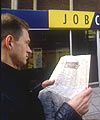|
job applications |
||
 |
||||||
|
Eduku Francis from Ghana writes:
I would like to know the difference between an application letter and a cover letter. I would like to have examples of application and cover letters. This is because I am always confused as to why both must be sent when one is looking for employment.
|
| |
||
| Roger Woodham replies: | ||
|
letter of application If you are responding to a job advertisement you may be asked to write a letter of application. This is the letter which lists all your work experience and qualifications and should also explain why you want the job. Begin your letter by telling the reader where you saw the advertisement:
You would then go on to list your experience and relevant qualifications:
You might then go on to say why you are particularly interested in this job and mention the particular abilities and skills that you have.
You might then close the letter with the following formula.
|
|
covering letter Many employers will ask you to write to them or phone them for an application form and further details when they advertise jobs. Sometimes you will be asked to send your CV or resume. Your CV or curriculum vitae lists your educational and career history and is a useful summary for an employer of all your educational and employment achievements up to the present time. You must always ensure that it is up to date. A covering letter may then be very useful because you can enclose it with your CV or a completed application form. In your covering letter you can draw attention to particular information which you wish to highlight. Such a covering letter might look like this:
If you have filled in an application form you do not need to send a CV because all the relevant information should be on your form.
|
||||
|
cover Note that cover as verb, noun and adjective is used in a variety of different ways: If you cover something, you place something else over it to protect it or hide it or close it:
cover = protection Cover can also be used to talk about protection from enemy attack or for talking about insurance.
cover = address or report on a topic Cover can be used to talk about studying a subject or in a journalistic context to talk about reporting.
cover for = substitute for someone at work
|
||||
|
If you would like more practice more please visit our in the You, Me and Us part of our website. |
||||
|
|
||||
|
|
||||